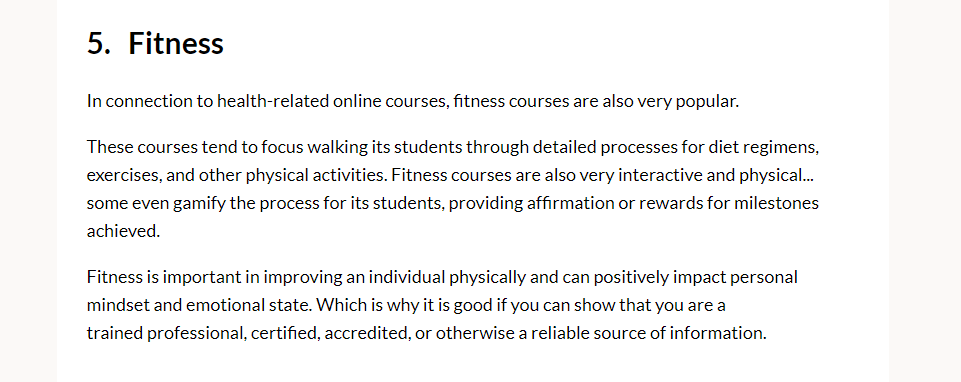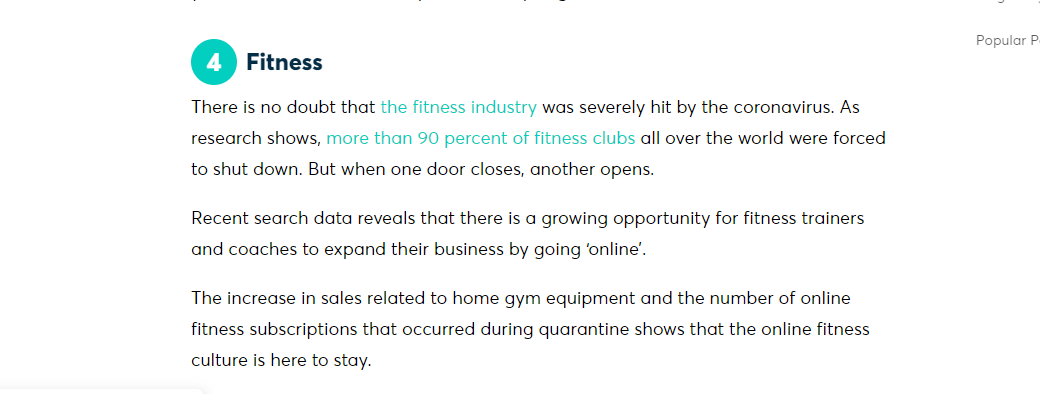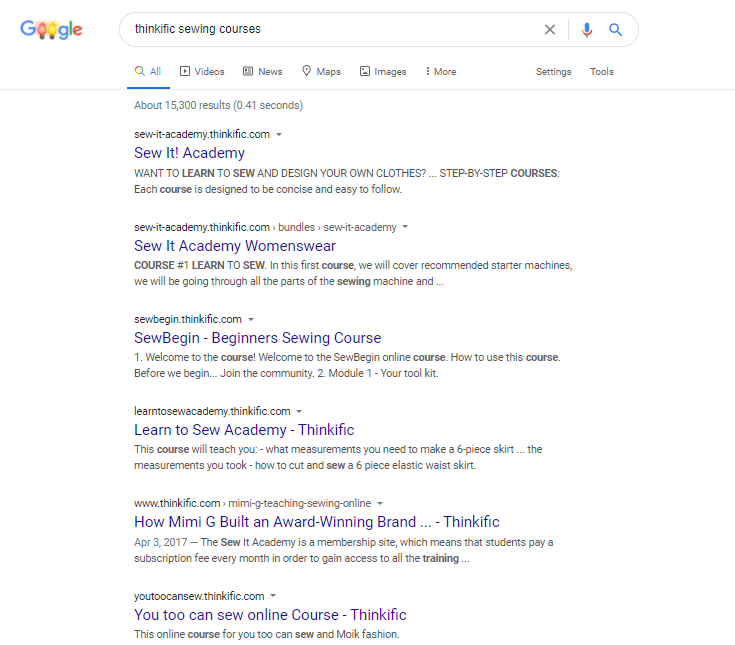We saw more people taking up online learning than in previous years.
The pandemic forced thousands of schools and universities to turn to virtual learning and online classes. Consumers, trainers, and other professionals have similarly invested more time in online courses to either pick up new skills or to offer their expertise to others.
This resulted in a massive surge of interest in online learning and digital coaching, a surge so large that it has implications for the industry going into the new year.
For aspiring course creators, this is a blessing and a curse. While there’s no doubt going to be a large audience for online learning in the years to come, the market is becoming saturated with the same course topics that make it hard for newcomers to stand out.
Are there any unexplored markets within online learning? How do you find that niche?
In this article, we’ll be outlining what an online course niche is, what it isn’t, and strategies for finding the right one for your online course creation business in 2023.
We offer this website completely free to our visitors. To help pay the bills, we’ll often (but not always) set up affiliate relationships with the top providers after selecting our favorites. However, we do our best not to let this impact our choices. There are plenty of high-paying companies we’ve turned down because we didn’t like their product.
An added benefit of our relationships is that we always try to negotiate exclusive discounts for our visitors.
What Defines The Right “Niche”?
So what do we mean by a “niche”?
A niche market is a segment of the larger market that has its own demand and preferences. It’s a marketing term used by companies to find underserved consumers.
Finding a niche market is all about identifying a specific audience and trying to reach them before your competitors. It’s about jumping on a new, unexplored opportunity so that you can be the first one to meet someone’s needs.
A niche market needs to be profitable or show potential for growth, otherwise, your competitors might’ve occupied that market segment already. Just because there aren’t many people capitalizing on a certain topic, doesn’t automatically make it profitable.
When it comes to online courses, finding the right niche is focused on addressing topics that a good number of people want to learn about, but don’t have enough resources to do so.
As such, finding the right niche for online courses comes with doing a little research and identifying a segment within the online learning market that has customers, room for growth, and not a lot of competition.
Sounds easy enough, right?
The Problems With Finding A “Good” Niche


Not so fast. When we initially did our research on niches for online learning, we ran into a big issue.
We found that articles on unexplored online course topics or specific “niches” all talked about the same course topics. Take, for example, online fitness.
We looked at three different articles talking about emerging online course niches, and all three extensively explored online fitness as an example.


While this isn’t a knock on these articles, it really makes you question the idea of a “niche” and how that applies to this context.


If at least three articles that we could easily find through a Google search about “niche online course topics” churns out the same paragraphs on how fitness is an online learning niche, then doesn’t that contradict the idea of a niche?


What we mean is that a niche market, as we’ve defined it, is a segment of the market that is under-explored despite having a sizable audience that wants a certain product. Topics like fitness can’t really be considered niche since these articles show analytics suggesting there’s plenty of online fitness course creators already.
Let’s look at another example. Another popular online course topic that gets thrown around as a profitable “niche” in many articles is sewing. With the pandemic, a lot of people have taken up sewing to pass the time and create their own blankets.
If you go on Google and search something like “online sewing courses,” you’ll find dozens if not hundreds of results. We narrowed it down to just sewing courses that were created through Thinkific, a popular course creation platform, and this is what we got:


Again, it’s hard to say something is a niche when you can find a handful of popular courses on the subject just through a simple Google search.
Our point here is that you can’t rely on finding the right niche for an online course by just Googling a few articles on it, since that contradicts the entire idea of a niche. If you’re reading an article about niche online learning topics, then those topics are probably already being milked dry.
So what are the best niches? Are there ways you can identify under-explored market segments that other course creators have yet to tap into?
How to Find Online Course Niches that Aren't Super Saturated


The bigger question still remains – how do you find an online course niche that isn't already exhausted?
While you can do all the research in the world, at the end of the day you’ll need to decide which field you want to explore. This is a deeply personal process, but there are actionable tips that can help you get there.
Be An Early Adopter
Finding the best niches for online courses requires a slightly different mentality. You have to be an early adopter, which is easier said than done.
This might require you to put your entrepreneurial hat on and dig into the research. Luckily, there are plenty of online tools to help you cast a wide net and understand where consumers stand in terms of popular trends.
Early Adopter Tools


If you want to see what course topics people are searching for, leveraging Ahrefs’ Keyword Explorer tool might help you out.
It helps you identify different keywords across multiple search engines, not just Google. If you find a few different topics that might be worth exploring, you can leverage their Content Explorer tools to discover and analyze top performing content within those niches.
Google Trends is another great open-source resource for exploring what people are searching. This can help give you insight into new, emerging niche markets before competitors monetize them.
These sites provide accurate information on what online learners are looking for. They can certainly help you identify topics that are picking up steam, at which point you can intervene and craft courses to meet those online course demands.
Tips for being an early adopter


Being an early adopter after you’ve identified a potential niche can require some trial and error. The important thing is to never be discouraged and keep trying different tactics.
Say you’ve identified an underserved audience that wants to learn about a topic. Since these are relatively new waters, you can try dipping your toes in this niche by offering smaller samples for your course.
Reach out to your target audience and get a feel for what type of online learning content they might be interested in and start crafting your own community.
Don’t be afraid to receive feedback during these early stages. Communicate with your audience and understand what they’re looking for to craft the ideal online course. This might require taking a few gambles, but that’s the nature of being an early adopter.
Navigating your online course niche takes risks, but it could lead you to a dedicated community around your content.
Know your passion and strengths
What are you enthusiastic about? What do you like to learn about?
Knowing where your passions lie can steer you towards a certain online learning category. Maybe you’ve taught or tutored other people before and you felt really passionate about those experiences.
Related to your passions are your strengths. What are you good at? What can you offer your students?
Aligning the things you love with your biggest assets can narrow down a topic that you might want to eventually explore.
Understand your target audience
Knowing your audience doesn’t stop at the preliminary stages. Once you’ve identified a demographic to create content for, keep exploring the little details.
What are their age groups? Do they occupy different racial or ethnic groups? How can you leverage that information to narrow your content?
Knowing your target audience will help you decide whether a certain niche is the right one for your talents and passions.
Curate reliable data
Once you’ve gotten a better understanding of your audience, it’s time to delve deeper into the numbers. Making data-backed decisions for your online courses is a tried and true way of gaining more attention for your content.
Leverage the aforementioned tools like Google Trends and Ahrefs. You can also explore other trusted sites such as Moz and their Keyword Explorer tools to curate valuable data and improve your SEO.
If you’re unsure about how to use these tools, no sweat. You can hire freelancers to do market research for you. We recommend sites like Fiverr, which has a large pool of dedicated and affordable freelancers ready to work.
Find the right platform
Once you’ve got the resources you need to craft an online course, it’s time to find the channels with which to distribute your content.
There are plenty of online course platforms available, such as Thinkific, Kajabi, Podia, and Udemy. Leverage the information about your audience to decide where and how to distribute your courses. Maybe certain platforms fit your niche more than others.
Social media platforms are also an important consideration if you want to advertise your courses within a certain niche. Identifying where your niche will be most relevant is key to boosting your exposure.
Be willing to adapt
Like we mentioned above, feedback is extremely valuable for finding your online course niche. Just because your course doesn’t pop on the first go-around doesn’t mean it’s doomed to fail.
Continue using data and analytics to monitor both your progress and any important market shifts. It’s important to understand that creating and advertising your online course content isn’t a one-and-done deal.
If you feel the need to re-do a lot of your research, don’t be afraid to do so. Combining your course creation skills with a data-driven approach can ensure long-term success.
Finding out why certain content didn’t take off is important for building your course creation strategy. It’ll probably take some trial and error, but you’ll keep finding ways to reach your audience and explore that niche.
Summary
Identifying and capitalizing on an online course “niche” can be an elusive and slightly abstract process. It’s dependent on your passion and willingness to put in the research.
With the online learning industry continuing to grow, you’ll need to sift through more and more data to find pockets of unexplored niches. Don't put too much stock on aggregated lists that do a round-up of the latest and greatest niches. They can point you in the right direction, but you'll likely need to find niches within the niches to really have success.
Leverage this article to understand the pitfalls of searching for niches while understanding how to craft strategies for identifying your own.





















